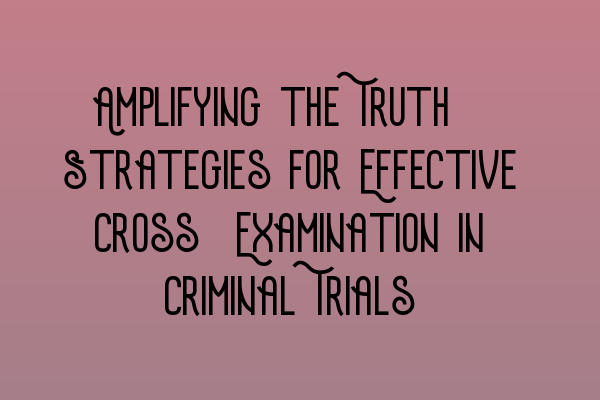Amplifying the Truth: Strategies for Effective Cross-Examination in Criminal Trials
At SQE Criminal Law & Practice Law UK, we understand the importance of effective cross-examination in criminal trials. As a solicitor, it is crucial to master the art of cross-examining witnesses to uncover the truth and present a compelling case. In this blog post, we will discuss some strategies that can help you amplify the truth during cross-examination.
Prepare Thoroughly
Preparation is key to successful cross-examination. Before stepping into the courtroom, it is essential to familiarize yourself with the case, evidence, and witness statements. Our SQE 1 Practice Exam Questions and SQE 1 Practice Mocks FLK1 FLK2 articles can help you practice and improve your knowledge for the exam. By having a strong understanding of the facts, you can effectively formulate questions that challenge the credibility and reliability of the witness.
Establish Rapport
Building rapport with the witness is a powerful tool in cross-examination. By creating a comfortable and friendly environment, you can encourage the witness to open up and provide more accurate information. SQE 2 Preparation Courses and SQE 1 Preparation Courses can help you develop the necessary interpersonal skills and techniques for establishing rapport with witnesses.
Ask Open-Ended Questions
Open-ended questions allow witnesses to provide detailed and descriptive answers, which can help reveal inconsistencies or gaps in their testimony. Avoid asking leading questions that suggest the answer you want. Instead, focus on eliciting comprehensive responses by using phrases such as “Can you describe…?” or “Tell us more about…?” Our SRA SQE Exam Dates article provides important information about exam schedules so you can plan your preparation effectively.
Listen Carefully
Active listening is crucial during cross-examination. Pay close attention to both verbal and non-verbal cues from the witness. Watch for any hesitations, changes in tone, or body language that may indicate deception or uncertainty. Being attentive will allow you to follow up with probing questions to uncover the truth.
Challenge Inconsistencies
One of the primary goals of cross-examination is to expose inconsistencies in the witness’s testimony. Be prepared to confront the witness with prior statements or contradictory evidence. By calmly and confidently presenting conflicting information, you can cast doubt on the credibility of the witness. SQE 1 Preparation Courses and SQE 2 Preparation Courses can provide you with the knowledge and skills necessary to identify and challenge inconsistencies effectively.
Control the Narrative
During cross-examination, it’s essential to maintain control of the narrative. Craft your questions strategically to guide the witness to the desired outcome. Use leading questions to obtain affirmative responses that support your case. However, be mindful of not badgering or harassing the witness, as it can negatively impact your credibility.
Stay Calm and Professional
Keeping your composure and remaining professional throughout cross-examination is crucial. Losing your temper or appearing overly aggressive can undermine your credibility and harm your case. Maintain a respectful and assertive demeanor while challenging the witness. Our SQE 1 Practice Mocks FLK1 FLK2 article provides valuable mock exam opportunities to practice handling cross-examination scenarios.
By following these strategies, you can effectively amplify the truth during cross-examination, ensuring a strong presentation of your case in criminal trials. For more information on preparation courses, practice exams, and SRA SQE exam dates, visit our related articles:
- SQE 1 Practice Exam Questions
- SQE 1 Practice Mocks FLK1 FLK2
- SQE 2 Preparation Courses
- SQE 1 Preparation Courses
- SRA SQE Exam Dates
At SQE Criminal Law & Practice UK, we are dedicated to providing comprehensive resources and expert guidance to help solicitors succeed in their criminal law careers.
